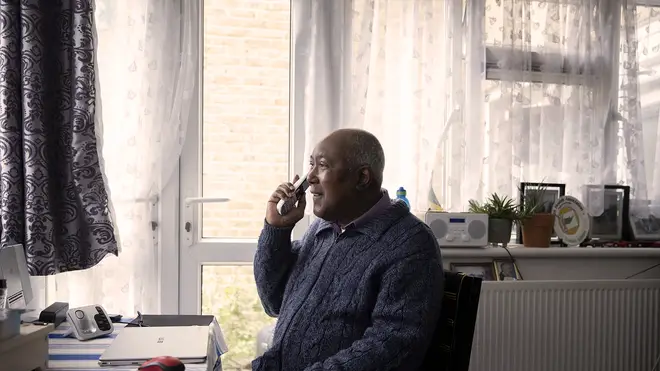
Simon Marks 4pm - 7pm
26 December 2021, 09:19

Over one million people are expected to be alone this Christmas and the issue is going to be made worse this year due to Covid-19. Here LBC looks at the reasons why, and what people can do to help.
For many people, Christmas is a time to come together with loved ones and celebrate the festive season.
However, for others, it is the time of year where they find themselves alone the most, especially in the middle of a pandemic.
Over a million people are estimated to be on their own this year due to Covid, with the Omicron variant causing increased concern over its transmissibility.
Read more: Covid self-isolation period cut from 10 days to seven in bid to save Christmas
Read more: 'Go ahead with your plans': Boris Johnson confirms no new Covid restrictions for Christmas

However, Covid is not the only reason people could be left on their own, with the elderly being largely affected every year.
Research from Age UK has found that 1.4 million older people were expecting to feel lonely this Christmas, resulting in high numbers feeling depressed and anxious.
The charity has organised a Make Christmas a Little Brighter campaign to help deliver a telephone service for those who need it most.
Michael, 71, is one of many who has benefitted from speaking to Age UK's Gemma via the Telephone Friendship Service.
He said: “Loneliness is devastating. It feels like having a prison sentence for 30 or 40 years - you've got no one to talk to or say anything to.
“Because of Covid, the past year or so has been even more devastating.
"I couldn't get out and about and if I didn't have Gemma I would be going spare. I always look forward to my call with her when Friday comes around, she is a diamond.
“Christmas, for me, is like being in a lockdown, so being able to speak to Gemma at this time of year makes such a difference, just having somebody at the end of the line who cares."
To volunteer for Age UK you can visit their site.

Michael's Story | Age UK
Samaritans has also launched a Christmas campaign - Be A Samaritans Christmas Star - in a bid to help those in need over the festive period.
They ensure listening volunteers are on-hand to respond to hundred of thousands of calls.
Stephanie, 33, from Kent, phoned Samaritans regularly just after Christmas 2015 when she was really struggling.
"Christmas always felt like a particularly difficult time. One year on Christmas Eve, it all got too much and I tried to take my life. I woke up the next day feeling very unwell, but I got dressed and went to visit my family for Christmas. I became good at putting on a front."
She explained: "I look back at the pictures and I’m smiling, but I wasn’t ok at all. That feeling built up and spilled over into the New Year. I didn’t know who to speak to, so one night I called Samaritans and let everything out.
"I remember feeling embarrassed and it took me a long time to get everything out. I am so thankful to that volunteer. He saved my life that night. I realised I didn’t want to die. I just didn't want to hurt anymore."
To volunteer for Samaraitans you can visit their site.

There are many reasons why someone is alone at Christmas - as mental health charity Mind points out - with the pandemic potentially leading to bereavement, grief for lost opportunities, pressure and expectations, to name just a few.
Mind's Head of Information, Stephen Buckley, has shared some advice on the best way to support those on their own: